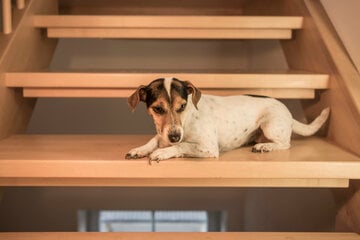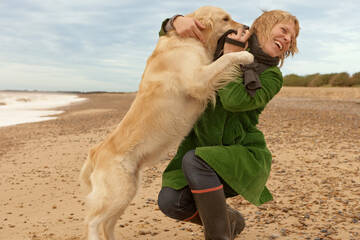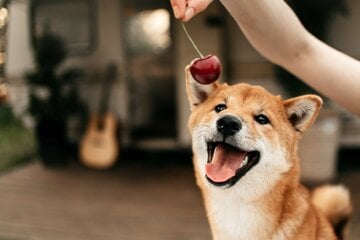Can dogs dive and swim underwater?
Have you ever wondered whether dogs can dive and hold their breath underwater? Is swimming good for dogs at all? Find out all you need to know with TAG24.

It's always wonderful to take your dog for a swim, whether that's in a nice little pool, a lake, river, or at the beach. But suddenly, you see it dive underwater and you get worried. Can dogs hold their breath at all, or are they at risk of drowning when they go beneath the surface?
As always, TAG24's Dog Guide has you covered. We'll take you through everything you need to know about diving dogs. To really make a splash with your canine companion, it's important to know what is and isn't safe – so let's dive into the main questions.
Can dogs dive or swim underwater from birth?
Many dogs can instinctively dive and swim underwater from birth, just as they naturally know how to paddle when they enter the water. Dog breeds that are known for being good swimmers are also better divers.
But there's a flip side too: not all dogs can swim from birth, so it's best to introduce your dog to water gradually and safely.
It's also worth remembering that even if your pooch takes to diving like a fish to water, it would be a mistake to compare its abilities to a human's. Whilst people can dive untrained in depths of up to 20 feet, dogs can generally only go as deep as 6-7 feet.
Can dogs hold their breath underwater?
Like many mammals, dogs naturally know to hold their breath when they are beneath the waves. This is due to a natural reflex that comes into effect when they are swimming underwater. As soon as a dog is below the surface, its windpipe automatically closes so that no water gets into the lungs, and breathing stops. In addition, its heartbeat slows down to reduce the body's need for oxygen.
Keep in mind, though, that being underwater can be quite dangerous for dogs. For example, if a dog falls into water unintentionally, or if it over exerts itself too much whilst swimming, it may try to breathe under the water.
Fun Fact: You can observe dogs' ability to hold their breath when they are drinking, because their muzzles stay underwater.
How long can dogs hold their breath underwater?
Unlike humans, who can hold their breath for a quite significant amount of time, dogs can only hold their breath for an average of five to 10 seconds. It depends a lot on factors pertaining to their breed, though. Dogs with longer snouts can generally tend towards the high end of that range, those with shorter snouts typically towards the lower range.
Keep in mind that a dog will suffer permanent brain damage if they are deprived of oxygen for three to five minutes. Anything approaching 10 minutes means there's virtually no chance of survival.

Which dogs are good at diving?
From a purely physical point of view, some breeds of dogs have a natural ease of movement when splashing around. Dogs with long legs, a long snout, "webbed" paws, and a larger lung volume will be better and more capable of diving underwater.
Dogs that are good at diving include:
- Labrador
- Landseer
- Newfoundland
- Retriever
- Sheepdogs
Top Tip: To test whether your four-legged friend can dive underwater, throw something into the water as part of a game of fetch. If your dog dives to retrieve the object, it can probably dive and swim underwater.
Dogs that aren't good at diving
Some dog breeds are just simply not suited to diving beneath the water. These breeds often have short legs, an elongated body, and a short neck. They have a lot of things going against them, as they have more difficulty breathing than bigger dogs, and are less capable of paddling. These dog types include:
- Boxer
- Bulldogs
- Dachshunds
- Pug
- Pekingese
Dogs with shorter noses have always had difficulty breathing and therefore have trouble holding their breath.
Advice on dogs diving underwater

In hotter months of the year, especially during summer, the cool water of a nice swim is particularly enticing for a dog. From the much-welcomed cooling effect of swimming, to the benefits of exercise and fun, there are plenty of advantages to encouraging your pooch to take a dive.
Here are some tips on how to make it more pleasant:
- Dry your dog: Although dogs instinctively shake out their fur after a water bath, they should still be dried again with a towel. Their ears are particularly important, because if too much water gets in there, it can disturb a dog's balance.
- Don't force anything: Dogs that have already had bad experiences with or in water, or are still very inexperienced, should not be forced to bathe or dive. When a dog is stressed, it's in no position to swim. It could panic and fail properly hold its breath. Never force a dog's head underwater!
- Take breaks: Dogs are bad at estimating distances and depths, as well as their own strength, so regular breaks and constant supervision are a must.
- Get some diving toys: Buy some objects that are heavy enough to sink to the bottom of a shallow pool, so that your dog can dive for them. Examples include rubber tubes filled with sand, bite-proof balls, or stronger ropes. Stones are a no-no, as these can damage the dog's teeth.
Conclusion
Dogs can hold their breath underwater instinctively and some are actually good at diving. But that doesn't mean they're always in control, so make sure to keep an eye on your four-legged friend when you're out for splash.
Cover photo: 123rf / Dmosreg



